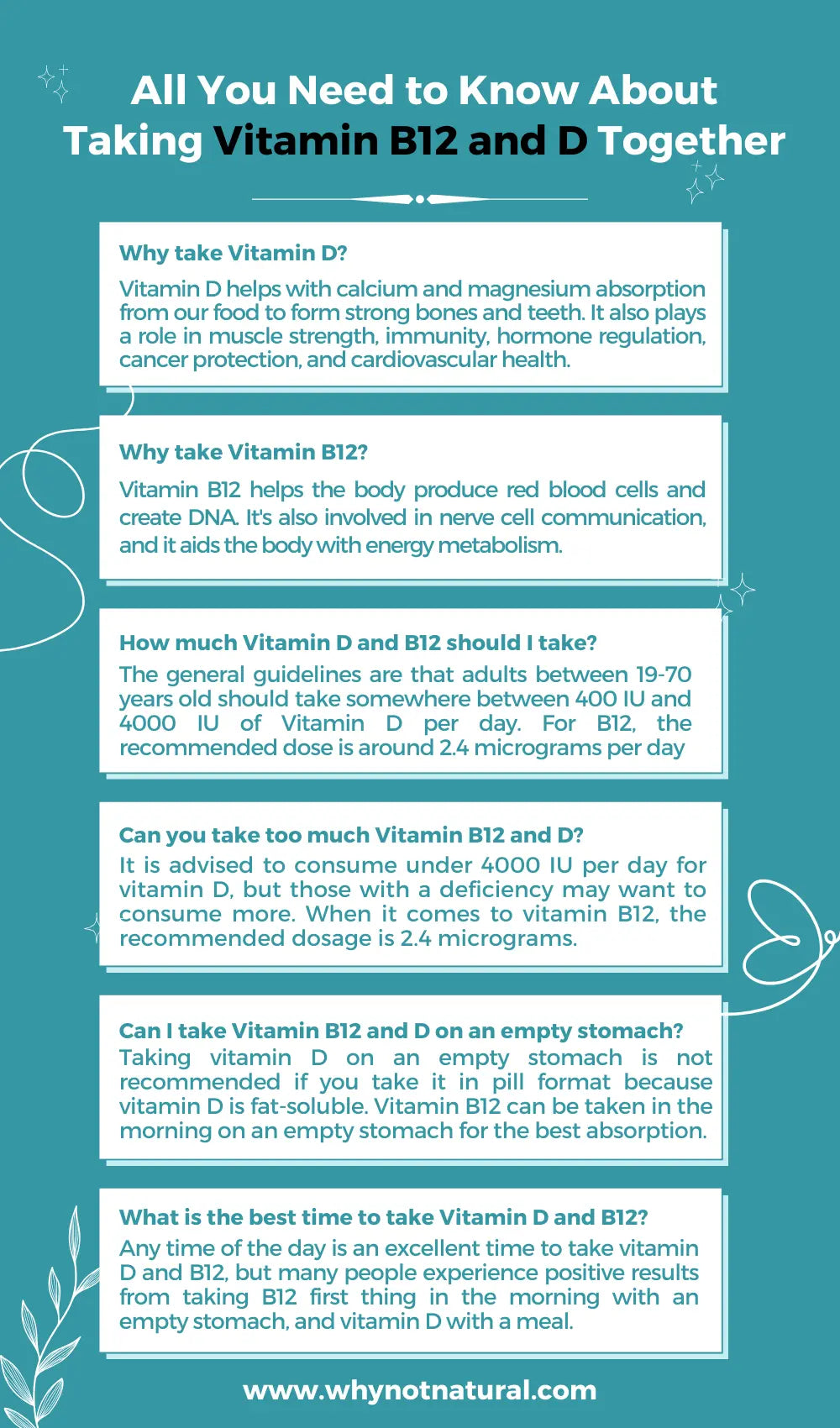

· By Lorea Lastiri
Can I Take Vitamin B12 And D Together?
Can I Take Vitamin B12 and Vitamin D Together?
Yes, vitamin B12 and vitamin D can be taken together. These two vitamins are often used at the same time because they serve different roles in the body and do not interfere with one another.
Vitamin D is a fat-soluble vitamin, while vitamin B12 is water-soluble. Because of this difference, taking them together or separately does not reduce their effectiveness. Many people choose to take both as part of a daily supplement routine.
Vitamin D supports calcium absorption and plays a role in bone and muscle function. Vitamin B12 supports normal nerve function and red blood cell formation. When taken appropriately, both nutrients can support overall health.
If you have heard conflicting information about whether these vitamins should be combined, this article explains how they work, how to take them, and what to keep in mind when supplementing.
Why Take Vitamin D?
Vitamin D is essential for normal bodily function. One of its primary roles is supporting calcium and magnesium absorption, which helps maintain strong bones and teeth. It is also involved in muscle function, immune health, and cellular processes.
The body produces vitamin D when the skin is exposed to sunlight. Dietary sources include fatty fish such as salmon and tuna, egg yolks, and fortified foods like milk or yogurt.
Some individuals may have difficulty maintaining adequate vitamin D levels due to limited sun exposure, seasonal changes, or geographic location. In these cases, supplementation may be considered under professional guidance.
What Happens if You Take Too Much Vitamin D?
Vitamin D toxicity is uncommon but can occur when very large doses are taken consistently over time. Possible symptoms may include nausea, vomiting, and reduced appetite.
Certain conditions, such as disorders involving parathyroid hormone regulation, may increase sensitivity to high vitamin D intake. For this reason, supplementation should be approached carefully and individualized.
Vitamin D intake recommendations vary depending on age, health status, and existing blood levels. Because individual needs differ, it is advisable to consult a healthcare professional before using high-dose supplements.
Why Take Vitamin B12?
Vitamin B12 plays an important role in red blood cell formation, DNA synthesis, and nerve cell communication. It also supports normal energy metabolism.
Low vitamin B12 levels may be associated with fatigue, neurological symptoms, and anemia. Vitamin B12 is found naturally in animal-based foods such as meat, seafood, eggs, and dairy products.
People who follow vegetarian or vegan diets may be at higher risk of inadequate intake and may consider fortified foods or supplements after consulting a healthcare provider.
What Happens if You Take Too Much Vitamin B12?
For most healthy adults, excess vitamin B12 from food or supplements is generally excreted in urine. Adverse effects are uncommon, though some individuals may experience mild symptoms such as dizziness.
People with certain medical conditions, including kidney disease, should use vitamin B12 supplements only under medical supervision. Any concerns about dosage or symptoms should be discussed with a qualified healthcare professional.
How Much Vitamin D and Vitamin B12 Should You Take?
General intake guidelines suggest that adults typically require modest amounts of both nutrients. Vitamin D needs vary widely depending on sun exposure, age, and existing levels. Vitamin B12 requirements are generally lower and may increase during pregnancy or in cases of malabsorption.
Because nutritional needs are highly individual, blood testing and professional guidance are the best ways to determine appropriate intake.
Can You Take Too Much Vitamin D and Vitamin B12 Together?
Taking vitamin D and vitamin B12 together does not increase the risk of adverse effects on its own. Issues generally arise only when one or both nutrients are consumed in excessive amounts for prolonged periods.
Vitamin D, being fat-soluble, can accumulate in the body, while vitamin B12 does not typically build up in the same way. Even so, supplementation should align with personal health needs and professional recommendations.
Can You Take Vitamin B12 and Vitamin D on an Empty Stomach?
Vitamin D is better absorbed when taken with a meal that contains fat, especially when taken in capsule or tablet form. Vitamin B12, on the other hand, may be taken with or without food and is often taken in the morning.
What Is the Best Time to Take Vitamin D and Vitamin B12?
There is no single best time of day to take these vitamins. Many people choose to take vitamin B12 earlier in the day and vitamin D with a meal, but timing can be adjusted based on personal preference and routine. Give a try to Why Not Natural Vitamin B12 supplement. They also have an excellent vitamin D supplement.
Consistency matters more than timing for most individuals.
Conclusion
Vitamin B12 and vitamin D can be taken together safely when used appropriately. Each nutrient supports different functions in the body, and combining them does not reduce their effectiveness.
As with any supplement, intake should be tailored to individual needs, dietary patterns, and health status. When in doubt, consulting a healthcare professional can help ensure safe and effective use.
Invitation to Subscribe to Our Newsletter
Want more clear, evidence-based guidance on vitamins, supplements, and everyday wellness? Subscribe to our newsletter for educational content designed to help you make informed health decisions with confidence. https://whynotnatural.com/pages/subscribe

